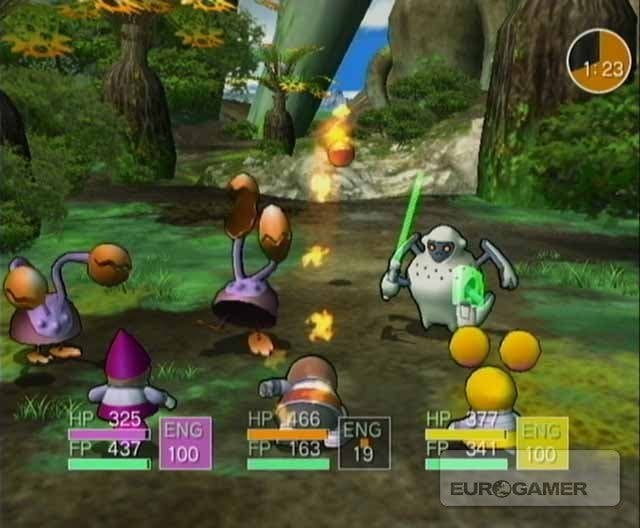Opoona
My First RPG for Wii.
Controlling the game just with the nunchuk works perfectly well, although having the Wiimote to hand does give you a few extra shortcut buttons and stops you having to stand still in order to look around with the camera. Battling is engagingly simple. The weird floating ball on Opoona's head is an Energy BonBon, and you attack enemies by flinging it at them with the nunchuk stick (no silly waving, mercifully). It's as simple as flicking the stick in a curve or straight ahead to smash monsters in the face/groin/tentacle thing - you have to judge when to hold the stick back for longer to deal more damage and when to go for quick attacks, but that's as challenging as it gets.
It's a shame that Opoona's general production takes the sheen off the very likeable presentation. Although the music's great, the same can't be said for the sound effects, which are actually non-existent in most cases. Significant cut-scenes happen to absolutely no sound at all on more than one occasion, which makes you wonder if Opoona was rushed out of KOEI's studios for some obscure reason.
The standard of the translation is poor, too - not bad enough to stumble unwittingly into genius, sadly, just banal and inaccurate. Characters will tell you to take the corridor on the right when there is no corridor on the right, for instance. It's a shame, because Opoona was obviously a funny game in Japanese, and a better-translated sense of humour would have really complemented the beguilingly strange visual style.

The environments might look great at times, too, but they're irritatingly hard to navigate, especially near the beginning, when you're presented with a stupidly vast city spread out over multiple floors, a confusing elevator system, a useless map and very vague mission objectives. You'll spend a lot of time wandering about looking for something or someone, and you're lucky if you know exactly what it is you're supposed to find. Opoona's protagonists do at least scoot about at a decent pace, but it's still annoyingly hard to get to where you're supposed to be.
To make things worse, at the beginning of the game, once you eventually get where you're supposed to be, the repetitive task you're usually assigned is a depressing reward for all that wandering.
Opoona is probably especially suited to younger players thanks to its simple control, leisurely pace and imaginative presentation; as long as there's someone around to help navigate the confusing cities, kids will have no problem at all enjoying this, and might take more readily to the game's humour and odd charm without feeling stifled by its simplicity. For most of us, though, Opoona is a curiosity - it's charming, strange and often fun, but too shallow and stretched out to make for a genuinely engrossing RPG experience.
